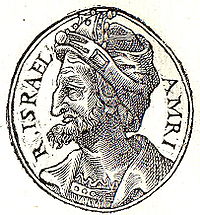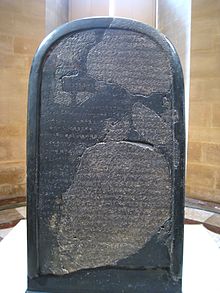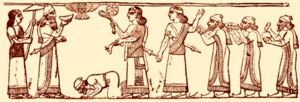- Omri
-
Kings of Ancient Israel - Saul • Ish-bosheth
- David • Solomon • Rehoboam
- Jeroboam I • Nadab
- Baasha • Elah
- Zimri
- Omri • Ahab • Ahaziah • Joram/Jehoram
- Jehu • Jehoahaz • Joash/Jehoash • Jeroboam II • Zechariah
- Shallum
- Menahem • Pekahiah
- Pekah • Hoshea
Omri (Hebrew: עמרי, Modern Omri Tiberian ʻOmrî; short for Hebrew: עָמְרִיָּה, Modern Omriyya Tiberian ʻOmriyyā ; "The Lord is my life") was a king of Israel, successful military campaigner and first in the line of Omride kings that included Ahab, Ahaziah and Joram.
He was "commander of the army" of king Elah when Zimri murdered Elah and made himself king. Instead, the troops at Gibbethon chose Omri as king, and he led them to Tirzah where they trapped Zimri in the royal palace. Zimri set fire to the palace and died after a reign of only seven days. (1 Kings 16:15-18)
Although Zimri was eliminated, "half of the people" supported Tibni in opposition to Omri. (1 Kings 16:21-22) It took Omri four years to subdue Tibni and at last proclaim himself undisputed king of Israel. (1 Kings 16:15 and 16:23) For the first six years, his capital was in Tirzah, after which he built a new capital of the kingdom in Samaria, on a hill he bought from Shemer. (1 Kings 16:23-24)
Omri became king of Israel in the 31st year of Asa, king of Judah and reigned for 12 years, 6 years of which were in Tirzah. (1 Kings 16:23) The biblical reference to the period of rivalry with Tibni is from the 27th year of Asa (1 Kings 16:15) to the 31st year. (16:23) William F. Albright has dated his reign to 876 – 869 BC, while E. R. Thiele offers the dates of 888 BC to 880 BC for his rivalry with Tibni and 880 – 874 BC for his sole reign.[1]
Some authors, especially Israel Finkelstein, maintain that the Book of Kings minimized Omri's accomplishments. They argue that while the biblical text acknowledges that Omri built his new capital Samaria, the text may have omitted possible widespread public construction both Omri and his son Ahab commissioned during their reigns. Finkelstein and his student Norma Franklin have identified monumental construction at Samaria, Jezreel, Megiddo and Hazor similar in design and build.[citation needed] Other archaeologists in Israel, including Amnon Ben-Tor, Amihai Mazar, William Dever and Lawrence Stager, reject this theory, claiming that it is contradicted by scientific understandings of strata formulation and the general development of the region, and that the theory relies overmuch on pottery seriation, a technique for dating sites using ceramic remains, which is a relative dating technique rather than an absolute technique such as carbon dating.[citation needed]
Omri's rule over Israel was secure enough that he could bequeath his kingdom to Ahab, thus beginning a new dynasty (sometimes called the Omrides), and his descendants not only ruled over the kingdom of Israel for the next forty years, but also briefly over Judah. He was significant enough that his name is mentioned on a stele erected by Mesha, king of Moab, who records his victory over a son of Omri—but omits the son's name. Thomas L. Thompson (The Bible in History), however, interprets the Mesha stele as suggesting that Omri is an eponym, or legendary founder of the kingdom rather than an historical person. Most archaeologists reject this interpretation, seeing Omri as historical. Assyrian kings frequently referred to Omri's successors as belonging to the "House of Omri" (Bit Hu-um-ri-a).[2]
Contents
The Omride Dynasty
The short-lived dynasty founded by Omri constitutes a new chapter in the history of the Northern Kingdom of Israel. It ended almost fifty years of constant civil war over the throne. There was peace with the Kingdom of Judah to the south, and even cooperation between the two rival states, while relations with neighboring Sidon to the north were bolstered by marriages negotiated between the two royal courts. This state of peace with two powerful neighbors enabled the Kingdom of Israel to expand its influence and even political control in Transjordan, and these factors combined brought economic prosperity to the kingdom.
On the other hand, peace with Sidon also resulted in the penetration of Phoenician religious ideas into the kingdom and led to a kulturkampf between traditionalists (as personified by the prophet Elijah and his followers) and the aristocracy (as personified by Omri's son and heir Ahab and his consort Jezebel). In foreign affairs, this period paralleled the rise of the Kingdom of Aram based in Damascus, and Israel soon found itself at war in the northeast. Most threatening, however, was the ascendancy of Assyria, which was beginning to expand westward from Mesopotamia: the Battle of Qarqar (853 BC), which pitted Shalmaneser III of Assyria against a coalition of local kings, including Ahab, was the first clash between Assyria and Israel. It was the first in a series of wars that would eventually lead to the destruction of the Kingdom of Israel in 722 BC and the reduction of the Kingdom of Judah to an Assyrian tributary state.
Omri in archaeological sources
In archaeology, Omri appears several times over the next century or so. The Moabite Mesha stele (on display in the Louvre) makes reference to the oppression of Moab by "Omri King of Israel". Israel would later become identified in sources as the "House of Omri" (Bit-Humria), with the term "Israel" being used less and less as history progressed (the other defining term for "Israel" is "Samaria", beginning in the reign of Joash). The Assyrian Black Obelisk (in the British Museum credits Jehu the (son of Jehoshaphat the son of Nimshi) as being the "son of Omri" while the Bible describes him to be "the son of Jehoshaphat the son of Nimshi" [3].
Archaeologically speaking, it would appear that Omri was recognized internationally as the founder of the Israelite Kingdom, though Ahab is actually the first king of Israel to appear in non-Israelite sources. The fact that theirs are the earliest attested names of Israelite kings and that the kingdom of Israel became associated with that of the former does not, however, establish that either was considered by these sources to actually be the first king of Israel.
Attitude in contemporary Israel
The Bible displays a negative attitude to King Omri, and it has been followed by later rabbinical tradition. However, Zionism was created mainly by non-religious (sometimes anti-religious) people who re-evaluated many Biblical characters (as well as characters from later Jewish history) according to the criteria of a secular national movement in need of National Heroes. As with many European national movements which served as an example to the founders of Zionism, ancient Jewish warriors in general and warrior kings in particular were often regarded positively. Omri, a successful warrior king and the founder of a strong dynasty, is a conspicuous example.
In the present-day Israeli society, "Omri" is quite a common male name, which would have been unthinkable in a traditional Jewish milieu.[citation needed] The same is true for the name "Nimrod", another Biblical character negatively regarded by pre-Zionist Jewish tradition. Omri Sharon, the elder son (and close political associate) of former PM Ariel Sharon seems among the most well-known among present bearers of the name. Omri Katz is an Israeli-American actor, born in Los Angeles to Israeli parents. Omri Casspi is an Israeli 6' 9" basketball small forward who was drafted in the 1st round of 2009 NBA Draft by the Sacramento Kings.[4]
See also
References
- ^ Edwin Thiele, The Mysterious Numbers of the Hebrew Kings, (1st ed.; New York: Macmillan, 1951; 2d ed.; Grand Rapids: Eerdmans, 1965; 3rd ed.; Grand Rapids: Zondervan/Kregel, 1983). ISBN 082543825X, 9780825438257
- ^ James B. Pritchard, ed., Ancient Near Eastern Texts Relating to the Old Testament (3rd ed.; Princeton: Princeton University Press, 1969) 283. ISBN 0-691-03503-2
- ^ 1 Kings 19:16, 2 Kings 9:2, 2 Kings 9:14, 2 Kings 9:20, 2 Chron 22:7
- ^ Nate Bloom (January 21, 2010). "Jews (and Mel) on the big screen, Winter sports roundup". Jweekly. http://www.jweekly.com/article/full/41080/jews-and-mel-on-the-big-screen-winter-sports-roundup/. Retrieved May 13, 2010.
External links
OmriRegnal titles Preceded by
ZimriKing of Israel
Rival to Tibni: 885 BC – 880 BC
Sole reign: 880 BC – 874 BCSucceeded by
AhabIsraelite kings and Kings of the Jews Family tree of kings of Israel and JudahPre-dynastic United Monarchy Israel (Northern Kingdom) Judah (Southern Kingdom)
(House of David)Hasmonean dynasty Simon Maccabaeus · John Hyrcanus · Aristobulus I · Alexander Jannaeus · Salome Alexandra · Hyrcanus II · Aristobulus II · Hyrcanus II · Antigonus II MattathiasHerodian dynasty Antipater the Idumaean · Herod the Great · Archelaus · Antipas · Philip the Tetrarch · Salome I · Agrippa I · Agrippa IIitalics indicate a disputed reign or a non-royal titleCategories:- Kings of ancient Israel
- Kings of ancient Judah
- Monarchs of the Hebrew Bible
- 9th-century BC biblical rulers
- Books of Kings
Wikimedia Foundation. 2010.




